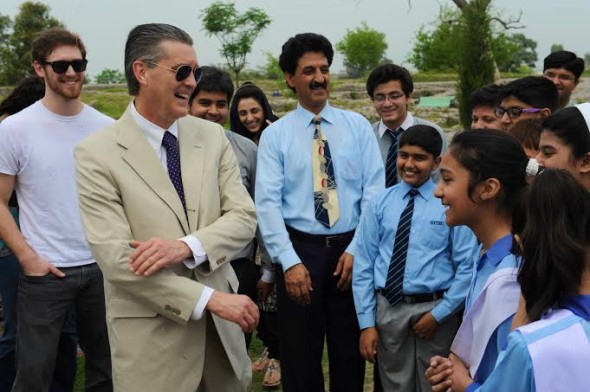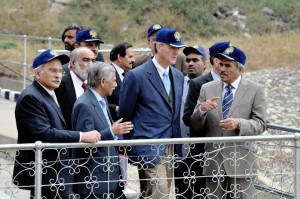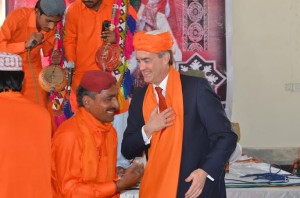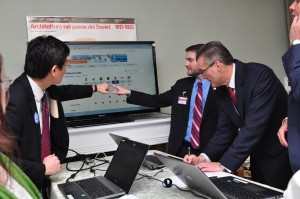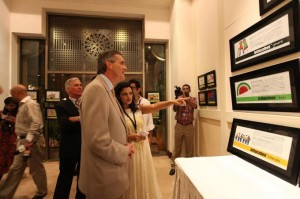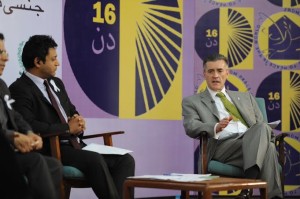The Khushali Ka Safar programme launched by the U.S. Embassy to promote entrepreneurship has been very well received. What prompted the U.S. Embassy to develop this unique programme for Pakistan?
Richard Olson: The United States believes that innovative, fast-growing businesses are the key to Pakistan’s economic future. That’s why we are working to support Pakistan’s talented and hard-working entrepreneurs, who will help fuel economic growth by creating jobs, boosting incomes, spurring innovation and expanding economic opportunity.
The Pakistan StartUp Cup competition received a resounding response. What are your views on the success of this initiative?
Richard Olson: The unexpectedly strong response indicates that there is a real need for this kind of coaching and mentoring. It is also indicative of the considerable talent and resourcefulness of Pakistani entrepreneurs. Over 400 startups competed in this contest, more than at any of the nearly 60 StartUp Cups held across the world. By providing Pakistan’s entrepreneurs with access to coaching and mentoring from seasoned business leaders, we are working to increase their chances of success.
What sectors do you feel hold the most potential for investment in Pakistan?
Richard Olson: Pakistan is a huge emerging market opportunity, and there are many well-known American companies already present in the Pakistani market and doing very well. The United States consistently ranks among the top sources of foreign direct investment in Pakistan. We want to see the number of U.S. firms grow and we are working to boost the bilateral trade and investment relationship between our two countries. We see opportunities across a range of industries, including consumer goods, construction, and energy. Pakistan’s efforts to improve the investment climate, increase access to energy, and strengthen governance will be an important means of attracting new investors.
The Pakistan Private Investment Initiative (PPII) aims to specifically develop Pakistan’s SME sector. What are your views on the potential of Pakistan’s SME sector?
Richard Olson: Small and Medium Enterprises (SMEs) are the backbone of Pakistan’s economy. SMEs also play an important role in increasing trade and investment that is a fundamental element in the stronger, broader, and deeper U.S.-Pakistan relationship. The Pakistan Private Investment Initiative will serve as an avenue for Pakistani SMEs to access the equity capital they need to expand, prosper and thrive into future generations.
How can Pakistani-American diaspora investors play a role in supporting Pakistan’s next generation of entrepreneurs?
Richard Olson: Pakistan’s diaspora community can be an important resource for entrepreneurs — they have strong ties to Pakistan and can help bridge the gap between raw talent in Pakistan and access to capital and know-how overseas. We are talking to Pakistani-American investors who are interested in Pakistan’s tremendous potential and how they can support Pakistan’s next generation of entrepreneurs through coaching, mentoring, networking, and access to capital.
Education plays a vital role in creating an entrepreneurial climate in Pakistan. What role does the U.S. have in Pakistan’s education sector?
Richard Olson: We recognise that obtaining a quality education plays a vital role in laying the basic foundation for entrepreneurial growth in Pakistan. To that end, we have built or reconstructed more than 600 schools, serving an estimated 86,000 children. We have provided 12,000 students with scholarships to local universities. We are pairing Pakistani and U.S. universities in fields critical for innovation and development: agriculture and food security, water and energy. We invest more in our Fulbright programme in Pakistan than anywhere else in the world.
In order for industry to grow and allow Pakistan to compete on a global scale the government must be able to provide enough power to support homes and businesses. What is the U.S.’s role on that front?
Richard Olson: The United States and Pakistan have a strong partnership in the energy sector and are working together to help Pakistan achieve the stable energy supply needed to accelerate Pakistan’s economic growth. The U.S.-Pakistan Energy Working Group met on November 12, 2013. This Ministerial meeting underscores our sustained bilateral relationship and the strong U.S. commitment in the energy sector.
At the Energy Working Group, we announced technical assistance to help Pakistan increase production and maximise recovery from existing gas fields, identify new areas for conventional gas development, and assist the government’s efforts to privatise distribution companies. These programmes build on ongoing assistance to refurbish hydroelectric and thermal power plants, install smart meters to reduce line losses, and complete the construction of dams like Satpara and Gomal Zam. Together, these projects have added more than 1,000 megawatts since 2009 to Pakistan’s national grid , enough electricity for more than 16 million Pakistanis, — a number equal to the populations of Lahore, Islamabad, Rawalpindi, and Hyderabad combined. Additionally, the U.S. Overseas Private Investment Corporation (OPIC) is also financing wind projects, including a $95 million loan to a prospective 50 MW wind power plant in southeastern Pakistan’s Gharo-Keti Bandar Wind Corridor.
Pakistan and the United States have a special bond and a unique historic relationship. What is your vision for the future of Pakistan-U.S. relations?
Richard Olson: The United States sees Pakistan’s prosperity as good for the region and good for the United States: we believe trade and investment are the future of the U.S.-Pakistan relationship. That’s why we organised U.S.-Pakistan Business Conferences in London in 2012 and Dubai in 2013, and the U.S.-Pakistan Energy Trade Mission to Houston in November 2013. These efforts represent the strong emphasis the United States places on its economic relationship with Pakistan and we look forward to a deepening trade relationship with Pakistan.
The United States Helps Revitalise
Medicinal Plants and Honey Industry in Khyber Pakhtunkhwa
The United States, through the U.S. Agency for International Development’s (USAID) Entrepreneurs Project, has trained 24,000 small business owners in the field of medicinal plants and honey. The Medicinal and Aromatic Plants and Honey Industry conference on 3rd February featured discussions aimed at developing the medicinal plant and honey sector in Pakistan. Plant collectors and bee-keepers discussed business opportunities with buyers and service providers.
During the conference, USAID’s Mission Director Gregory Gottlieb explained, “The U.S. Government is committed to working in partnership with the people and government of Pakistan to revitalise economic activity in the conflict and flood-affected communities of Khyber Pakhtunkhwa. We support Pakistan’s efforts to develop competitive products and forge lasting linkages with international markets to accelerate sales, investment, and job growth, particularly in the agriculture sector. This U.S.-Pakistan cooperation is helping Pakistan build economic prosperity for its people.”
In an effort to increase farmers’ incomes, the conference introduced plant collectors and beekeepers to successful agribusiness entrepreneurs. Representatives from the Khyber Pakhtunkhwa provincial government, including the Ministry of Forestry and the Provincial Reconstruction, Rehabilitation and Settlement Authority (PaRRSA) attended the symposium, along with experts, traders, and sales agents dealing in medicinal plants and honey.
“Assistance from the American people has helped uplift the economic situation of some of Pakistan’s poorest communities,” said Mr. Muhammad Tahir Orakzai, Director General of the Provincial Disaster Management Authority for Khyber Pakhtunkhwa. “This conference is a part of a broader agenda that the U.S. Government and the Government of Khyber Pakhtunkhwa are pursuing together to bring sustainable economic change to the region.”
This initiative is just one part of a comprehensive U.S. economic growth assistance program for Pakistan which includes expanding irrigation by 200,000 acres to spur farming near Gomal Zam and Satpara dams, and increasing the incomes of 250,000 farmers and female agricultural workers through training and increased access to market networks, allowing them to earn more money for the crops they grow.



